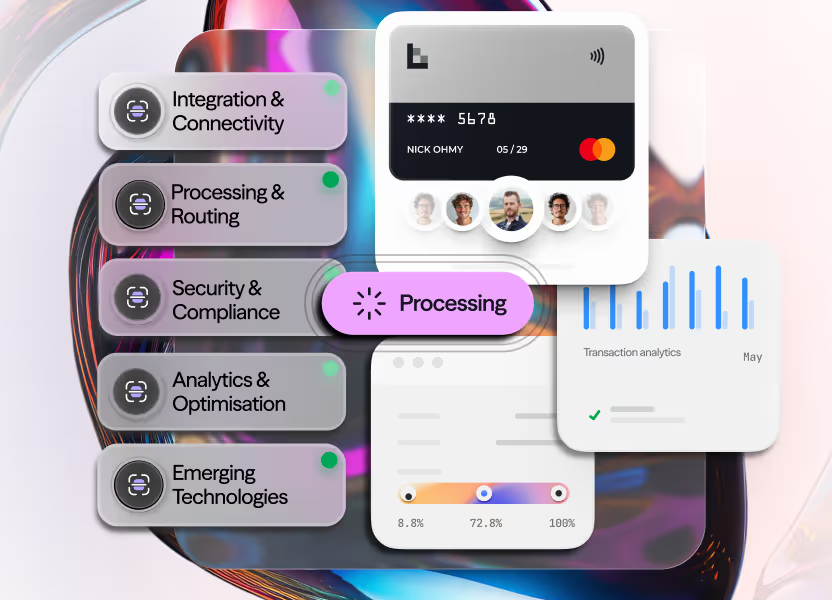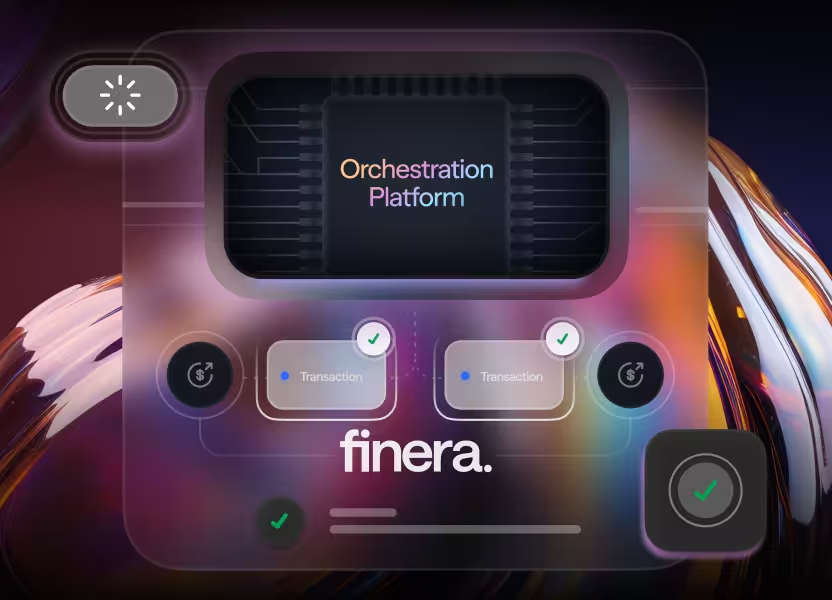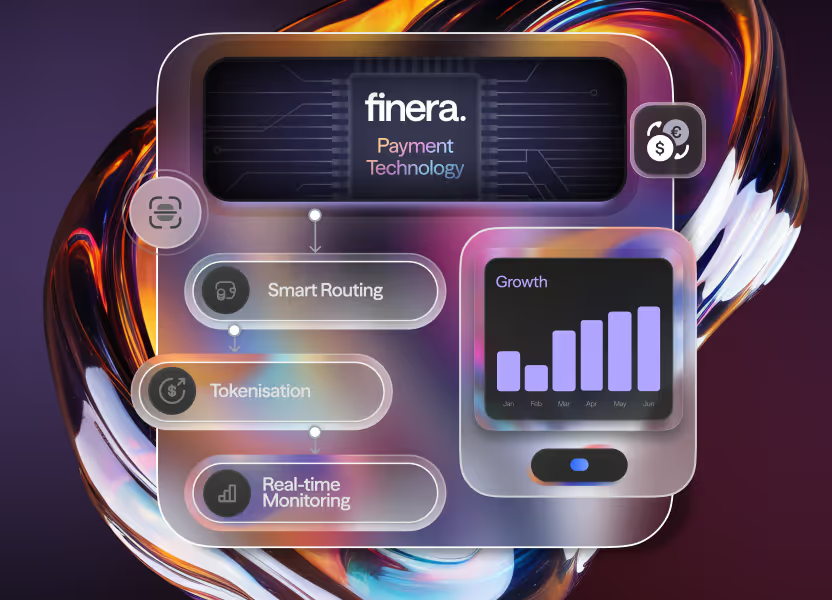Glossary of Payment Orchestration Terms (2025 Edition)
Your 2025 payment orchestration glossary. Decode key terms & future-proof your payments.

Payment orchestration has quickly become the backbone of modern digital commerce. As global transactions grow more complex, how can merchants cut through the noise and truly understand what drives higher approvals, smoother integrations and lower costs? The answer often lies in mastering the terminology and technology behind orchestration platforms.
That’s why we have created this payment orchestration glossary, a guide that breaks down key terms into clear, accessible explanations. Suppose you are a product manager, operations lead or payments professional. In that case, this glossary is designed to help you decode the jargon, understand the business impact and communicate more effectively with providers and partners.
Table of Contents
- Integration & Connectivity
- Processing & Routing
- Security & Compliance
- Analytics & Optimisation
- Emerging Technologies
Integration & Connectivity
API (Application Programming Interface)
A structured way for systems to communicate. In payment orchestration, APIs enable merchants to connect to multiple PSPs (Payment Service Providers) and acquirers through a single integration instead of separate ones.
Single Integration
A core feature of orchestration. Merchants connect once to the orchestration platform and gain access to multiple payment methods, acquirers and fraud tools, saving engineering time and accelerating go-to-market.
SDK (Software Development Kit)
A toolkit provided by orchestration platforms to simplify integration for developers. SDKs often include pre-built components for checkout flows, wallets and payment method configurations.
Processing & Routing
Smart Routing
Smart routing is the intelligent process of directing each transaction to the payment provider or acquirer most likely to approve it. Instead of sending every payment through a single acquirer, the system evaluates real-time data such as location, card type and past approval patterns, alongside historical analytics. This dynamic approach improves authorisation rates, reduces declines and ensures a smoother checkout experience. For merchants, the result is not only fewer lost sales but also improved customer satisfaction, since payments go through with less friction.
Retry Logic
Retry logic is a safety net for failed payments. When a transaction is initially declined, perhaps due to temporary network issues or acquirer downtime, the system can automatically reattempt the payment through an alternative route. For example, the retry may involve processing the transaction with a different acquirer, all without the customer needing to re-enter details. Done properly, retry logic recovers otherwise lost revenue and maintains trust by reducing unnecessary checkout abandonment.
Alternative Payment Methods (APMs)
Alternative Payment Methods (APMs) refer to non-card payment solutions that give customers greater choice and flexibility at checkout. These include popular digital wallets such as Apple Pay, Google Pay or PayPal, direct bank transfer options, local payment schemes like BLIK in Poland or iDEAL in the Netherlands, and buy now, pay later (BNPL) services. With consumer preferences shifting rapidly, especially in cross-border commerce, offering APMs has become a necessity rather than a “nice-to-have”. Payment orchestration platforms make it easy for merchants to integrate and scale APMs quickly across markets, meeting customer expectations and reducing cart abandonment.
Acquirer
An acquirer, sometimes called an acquiring bank, is a financial institution that processes card payments on behalf of a merchant. Acquirers play a crucial role in connecting merchants to card networks and ensuring transactions are settled. However, relying on a single acquirer can expose merchants to regional approval gaps, technical outages, or cost inefficiencies. Through orchestration, businesses can optimise acquirer selection across geographies, routing transactions to the partner with the highest likelihood of approval in each context. This flexibility is vital for global merchants seeking both reliability and cost efficiency in their payment stack.
Security & Compliance
PCI DSS (Payment Card Industry Data Security Standard)
A global standard for ensuring that merchants securely handle cardholder data. Orchestration platforms help reduce the merchant’s compliance burden by handling sensitive data securely.
Tokenisation
The process of replacing sensitive card details with a non-sensitive token. Tokens can be stored and reused securely for recurring billing or one-click checkouts.
3D Secure (3DS)
An authentication standard is mandated for many transactions. Payment orchestration platforms manage 3DS intelligently, ensuring a smooth customer experience while meeting regulatory requirements.
Fraud Prevention Tools
Machine learning and rules-based systems are integrated into orchestration platforms to detect suspicious transactions and reduce fraud without impacting genuine customers.
Analytics & Optimisation
Authorisation Rate
The percentage of transactions successfully approved by issuers or acquirers. A key performance metric for merchants, improving authorisation rates directly impacts revenue.
Payment Analytics Dashboard
A centralised reporting tool provided by orchestration platforms. It allows merchants to monitor performance, track declines and optimise routing strategies in real time.
Conversion Rate Optimisation (CRO)
The practice of using payments intelligence to maximise completed checkouts. Payment orchestration contributes by offering seamless methods, higher approvals and reduced friction.
Emerging Technologies
Open Banking Payments
A growing alternative to card payments. Open banking enables direct bank-to-bank transfers, often with lower fees and faster settlement. Payment orchestration integrates open banking as an additional payment rail.
Crypto Payment Processing
Support for digital currencies like Bitcoin, Ethereum or stablecoins within the orchestration framework. Though still early, crypto payments are gaining traction in industries like travel and iGaming.
Network Tokenisation
Issued by card networks, network tokens offer an extra layer of security and can reduce declines caused by outdated or expired cards. Orchestration platforms help merchants adopt them seamlessly.
Embedded Finance
The integration of financial services (such as lending or insurance) directly into digital platforms. Payment orchestration acts as an enabler by managing payment infrastructure beneath these offerings.
Why This Payment Orchestration Glossary Matters
The payments landscape is evolving at lightning speed and so is the terminology. Understanding the language of payment orchestration offers a significant competitive edge. Businesses that clearly understand these terms are better equipped to make informed choices, foster stronger collaborations with partners and adapt proactively to evolving industry dynamics.
This payment orchestration glossary has been designed to simplify complex jargon, give you clarity where it matters most, and help you evaluate providers with confidence. As new technologies and regulations emerge, we will continue updating it to keep you informed.
At finera., our mission is to help businesses reduce costs, improve approval rates and scale globally with smarter orchestration. Want to see how it could work for your business? Talk to our team today.
This article on payment methods is for informational and educational purposes only.
- Not Professional Advice: The content provided does not constitute financial, legal, tax, or professional advice. Always consult with a qualified professional before making financial decisions.
- No Liability: The authors, contributors, and the publisher assume no liability for any loss, damage, or consequence whatsoever, whether direct or indirect, resulting from your reliance on or use of the information contained herein.
- Third-Party Risk: The discussion of specific payment services, platforms, or institutions is for illustration only. We do not endorse or guarantee the performance, security, or policies of any third-party service mentioned. Use all third-party services at your own risk.
- No Warranty: We make no warranty regarding the accuracy, completeness, or suitability of the information, which may become outdated over time.
Frequently Asked Questions

Still Have Questions?
Let’s Find the Right Solution for You
Stay Connected with Us!
Follow us on social media to stay up to date with the latest news, updates, and exclusive insights!









.avif)